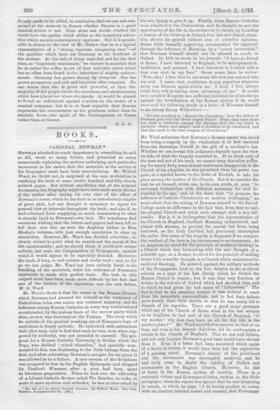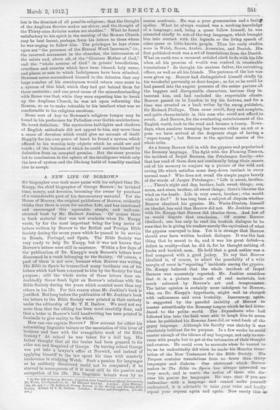BOOKS.
CARDINAL NEWMAN.* NEWMAN attached so much importance to everything he said or did, wrote so many letters, and preserved so many -memoranda explaining the motives underlying each particular movement in his career, that the materials at the service of his biographer must have been overwhelming. Mr. Wilfrid Ward, we doubt not, is surprised at his own moderation in confining his -book to some twelve hundred and fifty closely printed pages. But without sacrificing any of the original documents, the biography might have been made much shorter if the author after stating his own view of the effect of Newman's career, which he has done in an introductory chapter of great skill, had not thought it necessary to repeat his general view at intervals throughout the book ; and also if he had refrained from supplying so much commentary to what is already lucid in Newman's own text. We sometimes find ourselves wishing that the letters and papers had been left to tell their own tale, as were the Anglican letters in Miss .Mozley's volumes, with just enough annotation to clear up obscurities. However, Mr. Ward has decided otherwise ; he clearly wished to point what he considered the moral of the -life unmistakably; and we should think it could now escape nobody, not even the Congregation of Propaganda, against which it would appear to be especially directed. Moreover, the book, if long, is well written and easily read ; and, so far as we can judge, Mr. Ward has been entirely frank in his handling of the materials, while his criticism of Newman's opponents is made with perfect taste. His task in this respect must have been made more difficult by the fact that one of the leaders of the opposition was his own father, W. G. Ward.
Mr. Ward's thesis is that the career in the Roman Church, which Newman had planned for himself as the vindicator of Catholicism to his own nation was rendered nugatory, and hie influence among Roman Catholics in every way restricted and counteracted, by the jealous fears of the narrow party which . ;then, as now, was dominant at the Vatican. The story which he unfolds of the gradual crushing out of Newman's hope of usefulness is deeply pathetic. He undertook with enthusiasm task after task, only to find that each in turn, even when sug- gested by authority, was not intended to succeed. The pro- posal for a Roman Catholic University in Dublin, which the Pope, who disliked "mixed education," had specially com- mended to him, was displeasing to the Irish bishops from the first, and after exhausting Newman's energies for six years it was allowed to be a failure. A new version of the Scriptures was proposed to him by the English Episcopate and dropped by Cardinal Wiseman after a year had been spent in laborious preparation. When he took over the editorship of a Liberal Catholic Review called The Rambler, in order to make it more cautious and orthodox, be was at once asked by
• The nip of .1 hn Henry Cardined Newman. By Wilfrld Ward. Two Vole, • Eoudon: tonEwitns and Co. 068.] his own Itishop to give it up. Finally, when Roman Catholics were admitted to the Universities, and he thought he saw the opportunity ofhis life in the endeavour to ensure, by founding a branch of the Oratory in Oxford, that this new liberal educa- tion should be -gained without loss of orthodox opinions, Rome, while formally approving, accompanied the approval, through the influence of Manning, by a "secret instruction" that Newman himself should not be allowed to reside in Oxford. In 1860 he wrote in his journal : "1 have no friend at Rome; I have laboured in England, to be misrepresented, backbitten, and scorned. I have laboured in Ireland, with a door ever shut in my face." Seven years later he writes : "Now, alas! I fear that in one sense the iron has entered into my soul. I mean that confidence in any. superiors whatever never can blossom again within me. I shall, I feel, always think they will be taking some advantage of me." lb would have satisfied Kingsley as a sufficient justification of his charge against the truthfulness of the Roman system if he could have read the following words in a letter of Newman himself to his.friend Henry Wilberforce :— "Do you recollect in Harold the Dauntless' ,how the Abbot of Durham gets over the fierce pagan Dane P Since that time there has been a tradition among the Italians that the lay mind is barbaric—fierce and stupid—and is destined to be outwitted, and that flue craft is the true weapon of Churchmen."
Mr. Ward maintains that Newman's Roman career was saved from being a tragedy by the vindication it at last received from the Sovereign Pontiff in the gift of a cardinal's hat. Whether we can accept this judgment depends upon the view we take of what the tragedy consisted in. If we think only of the man and not of his work, we cannot deny that after suffer- ing for nearly forty years almost continuous disapproval in the Church of his adoption, he was permitted when his power was gone, as a special favour to the Duke of Norfolk, to take his place among the leaders of the Church. But if we consider the task he set himself, which was, in his own words, at once "to surround Catholicism with defences necessary for and de- manded by the age," and at the same time "to promote the influence of Catholic Christianity on modern civilization," we must admit that the raising of Newman himself to the Sacred College made no difference to the fact that, from first to last, his adopted Church met every such attempt with a no,i tali auxilio. Nor is it to be forgotten that the representative of his Church in England, Cardinal Manning. endeavoured, and almost with success, to prevent the scarlet hat from being bestowed, as the Irish Cardinal had previously intercepted the mitre. Our sense of the tragedy is deepened if we compare the conduct of the hero in his two successive environments. As an Anglican he stood for the principle of medieval theology in a Church which was fermenting with the new thought of a scientific age; as a Roman lie stood for the principle of making terms with scientific thought in a Church which maintained its medieval theology. He pointed, against the military methods of the Propaganda, back to the free debates in the medieval schools as a type of the lost liberty which he wished the Roman Church to regain ; but it was that very freedom of debate in the schools of Oxford which had shocked him, and to which he had given the bad name of "Liberalism." The fact is that to his sensitive temper it was natural to react from his immediate surroundings, and to feel their defects more keenly than their merits, so that he was easily led to despair of his republic. There are a good many passages which say of the Church of Rome what in his lag sermon as an Anglican he had said of the Church of England, "0 my mother I why dost thou leave us all the day idle in. the market-place?" Mr. Ward nevertheless assures us that at no time, not even in his deepest dejection, did he contemplate a return to the Church of England. This we can well believe, and not only because Newman's good taste would have shrunk from it. Even if a letter had been recovered which spoke of a desire to return, it would have been but the expression of a passing mood. Newman's theory of the priesthood and the sacraments was thoroughly medieval, and he had early come to doubt the validity of Orders and sacraments in the English Church. Moreover, he felt at home in the Roman system of worship. There is a curiously violent and ill-tempered letter, written to the Globe newspaper, when the report was spread that he was preparing to secede, in which he says, "I do hereby profess ex animo, with an absolute internal assent and consent, that Protestant- ism is the dreariest of all possible religions ; that the thought of the Anglican Service makes me shiver, and the thought of the Thirty-nine Articles makes me shudder." What he found satisfactory to his spirit in the worship of the Roman Church may be best learnt, perhaps, from his letters to those whom he was urging to follow him. The privileges he lays stress upon are the presence of the Eternal Word Incarnate," i.e., the reserved sacrament in the churches, the intercession of the saints and, above all, of the "Glorious Mother of God," and the "whole armour of God" in priests' benedictions, crucifixes and rosaries which have been blessed, holy water, and places or acts to which Indulgences have been attached. Newman never surrendered himself to the delusion that any large number of his countrymen would return once more to a system of this kind, which they had put behind them for three centuries ; and one great cause of the misunderstanding with Rome was that, while they were expecting him to break up the Anglican Church, he was set upon reforming the Roman, so as to make tolerable to his intellect what was so comfortable to his religious emotions.
Some sort of key to Newman's religious temper may be found in his preference for Palladian over Gothic architecture. He loved definition. The mysterious half-lights and shadows of English cathedrals did not appeal to him, any more than a sense of devotion which could give no account of itself. Happily for his own peace of heart he found a system which offered to his worship holy objects which he could see and touch ; of the holiness of which he could convince himself by deduction from an accepted premiss. But the same premise led to conclusions in the sphere of the intelligence which only the love of system and the life-long habit of humility enabled him to accept.











































 Previous page
Previous page